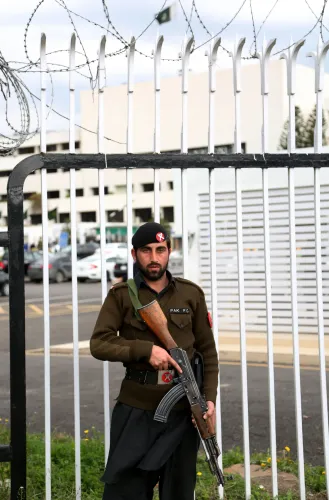Does Pakistan's Constitutional Amendment Indicate a Major Shift in Civil-Military Relations?

Synopsis
Key Takeaways
- The PCA introduces significant changes to Pakistan's military structure.
- It consolidates power in the hands of the Army Chief.
- Lifelong immunity for the Field Marshal raises accountability concerns.
- The amendment may alter civil-military dynamics significantly.
- It has sparked widespread debate about its implications for democracy.
Islamabad, Nov 12 (NationPress) The proposed 27th Constitutional Amendment (PCA) in Pakistan represents not just a significant overhaul of the country's defense framework but also an important evolution in the dynamics between civil and military relations. This amendment, fast-tracked through legislative channels, introduces notable modifications to both the judicial and military architecture of Pakistan, according to a recent report.
The amendment seeks to reorganize the Supreme Court, establish a new Federal Constitutional Court, and reshape the military hierarchy. A key feature of these changes is that the Chief of Army Staff will also assume the title of Chief of the Defence Forces (CDF), with the potential for promotion to Field Marshal, accompanied by lifetime privileges and immunity. L Ali Khan, founder of the Legal Scholar Academy and an Emeritus Professor of Law at Washburn University, shared these insights in a commentary for Jurist News.
Khan emphasized that the revisions to Article 243 will have a profound effect on accountability and the rule of law. Specifically, these amendments enhance the Army Chief's authority, constitutionally establish the Field Marshal role, politicize the Field Marshal rank, and provide unprecedented immunity that could protect the Field Marshal from any form of legal accountability. The timing of the PCA—coming just before a senior general's retirement—suggests a motive not merely to streamline leadership but also to consolidate extraordinary power in a single military figure, the Army Chief.
As the government has already conferred the title of Field Marshal on General Asim Munir, the changes to Article 243 are designed to empower him directly. By modifying this constitutional provision, the PCA abolishes the position of Chairman of the Joint Chiefs of Staff Committee and reallocates its coordinating responsibilities to the Army Chief, who will also hold the new designation of CDF. Consequently, every Army Chief will oversee not just the land forces but also the Navy, Air Force, and intelligence sectors within a unified command structure.
This consolidation of power is unprecedented, surpassing even previous military regimes in Pakistan. Historically, while the Army Chief was the most powerful figure in the military, other branches maintained operational independence. The PCA now solidifies a hierarchy placing the Army Chief at the apex of all military branches, transforming what was once a dominant role into a constitutionally superior one. Section 9 of the PCA Article 243 grants immunity to the Field Marshal under Article 248 of the Constitution, stating that 'No criminal proceedings whatsoever shall be instituted or continued against the President… in any court during his term of office.' This protection is extended to the Field Marshal, as reported by Jurist News.
By revising Article 248, the PCA dismantles a crucial barrier between civilian and military accountability, as it provides lifelong immunity to the Field Marshal. This means that if an Army Chief is elevated to the position of Field Marshal, he will enjoy perpetual immunity for any crimes committed while serving as Army Chief. This creates a significant legal disparity, given that the President's immunity lasts only while in office, while the Field Marshal's protection endures indefinitely, even after relinquishing command.
A Jurist News report stated that the proposed Twenty-Seventh Amendment signifies not only a structural shift in Pakistan’s defense system but also a constitutional transformation in civil-military relations. By granting lifelong absolute immunity to the Field Marshal, the PCA risks undermining the rule of law, especially while the individual serves as Army Chief. The principles of constitutional democracy mandate that all public authority, civilian or military, must be exercised in accordance with the law and remain subject to accountability and oversight.
If passed without amendments, the PCA will allow the Field Marshal to function beyond legal constraints, establishing a form of exceptionalism that contradicts constitutional governance. No one should be above the law for life or exempt from Article 6 of the Constitution. If enacted, Pakistan’s Twenty-Seventh Amendment could serve as a cautionary tale of how constitutional frameworks can facilitate military supremacy within a democratic context. The message is clear: when absolute immunity supplants accountability, the constitution transitions from a governing framework to a protective shield for violators.









